Lcd companion boards support (VKLCD50RTA & VKLCD70RT)
What is this ?
This is a demo program using Renesas RGA library & USB Camera to demonstrate VK-RZ/A1H's companion boards workability.
Supported companion Boards:
VKLCD50RTA
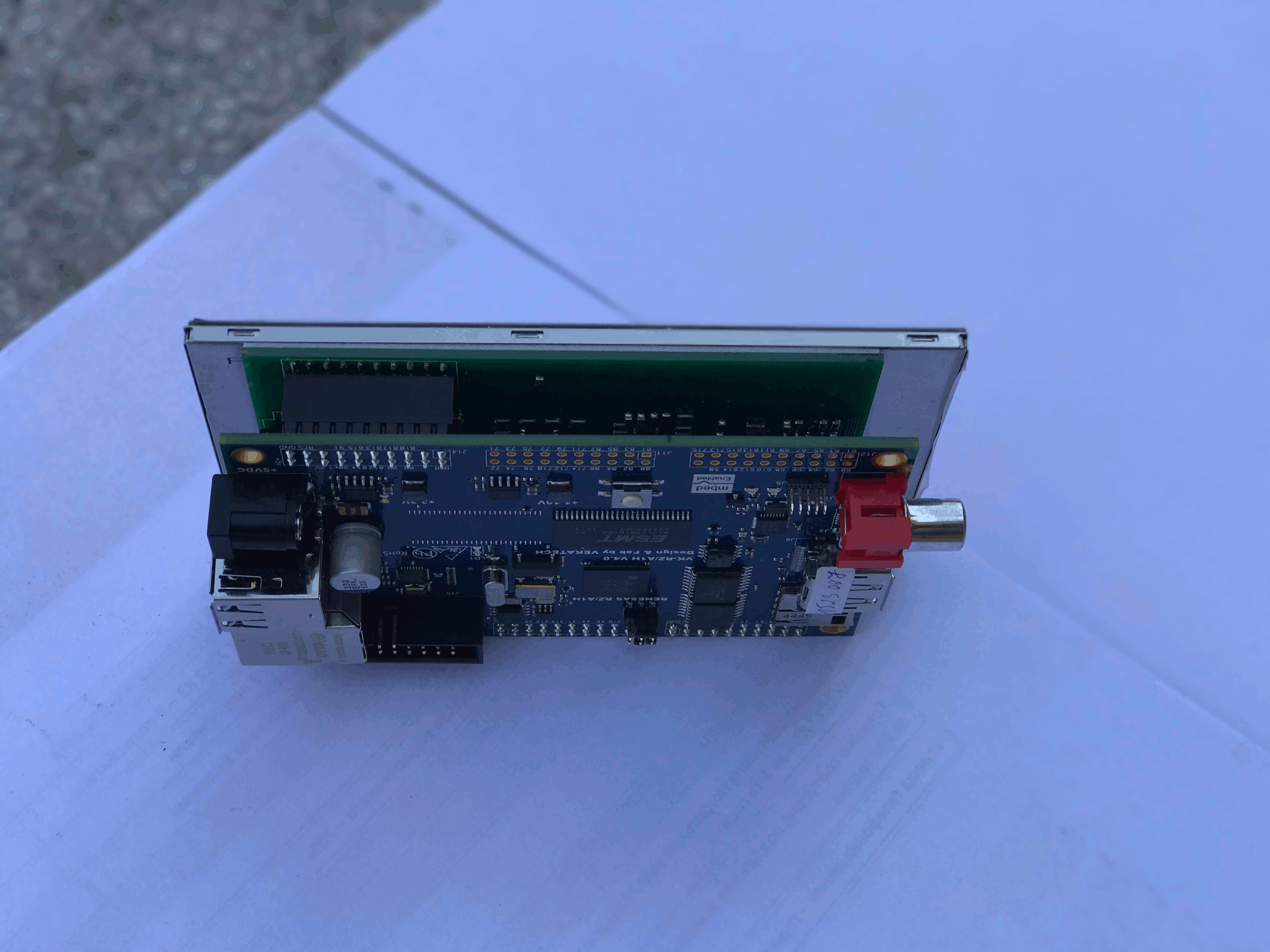
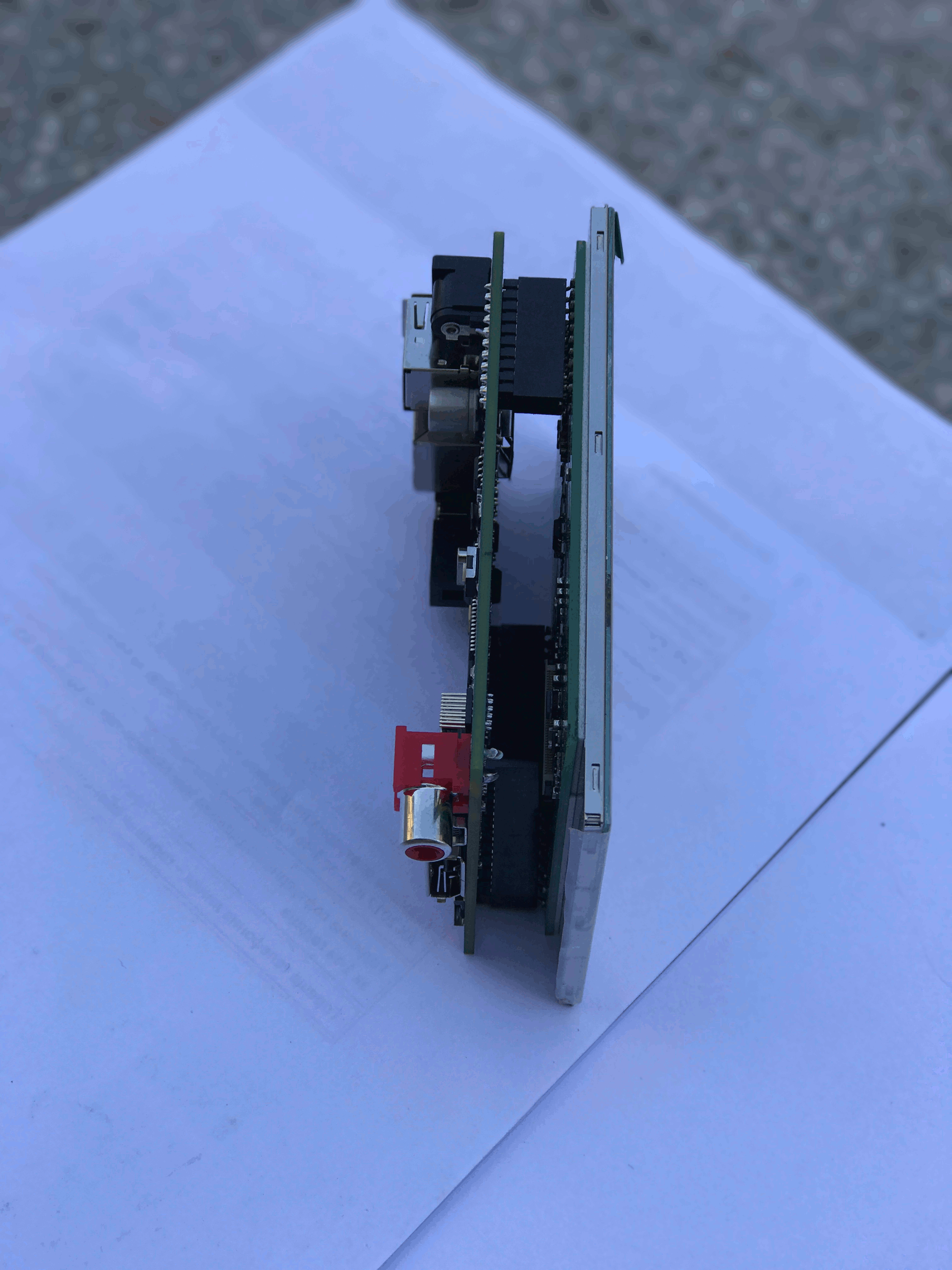
VKLCD70RT
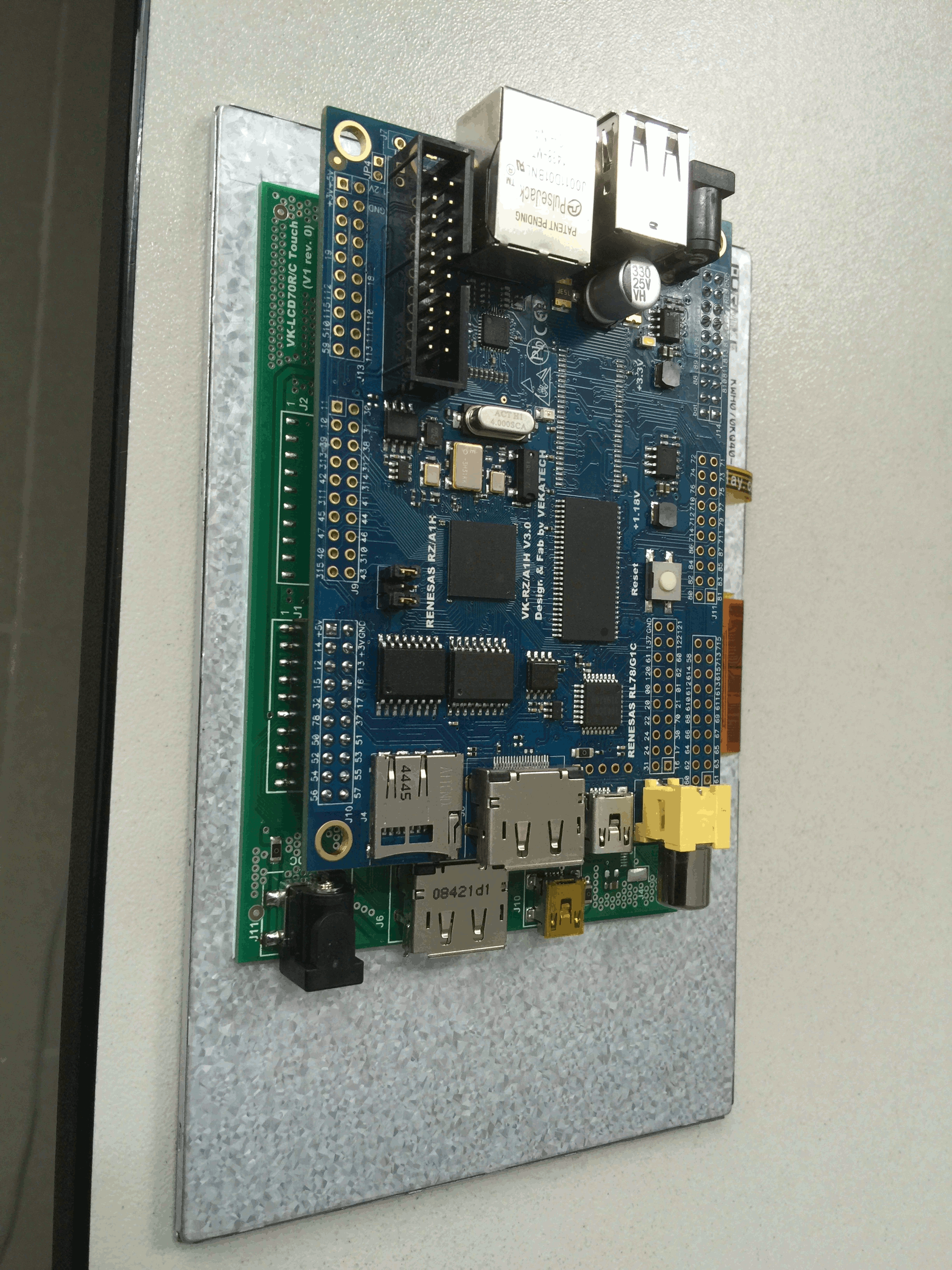
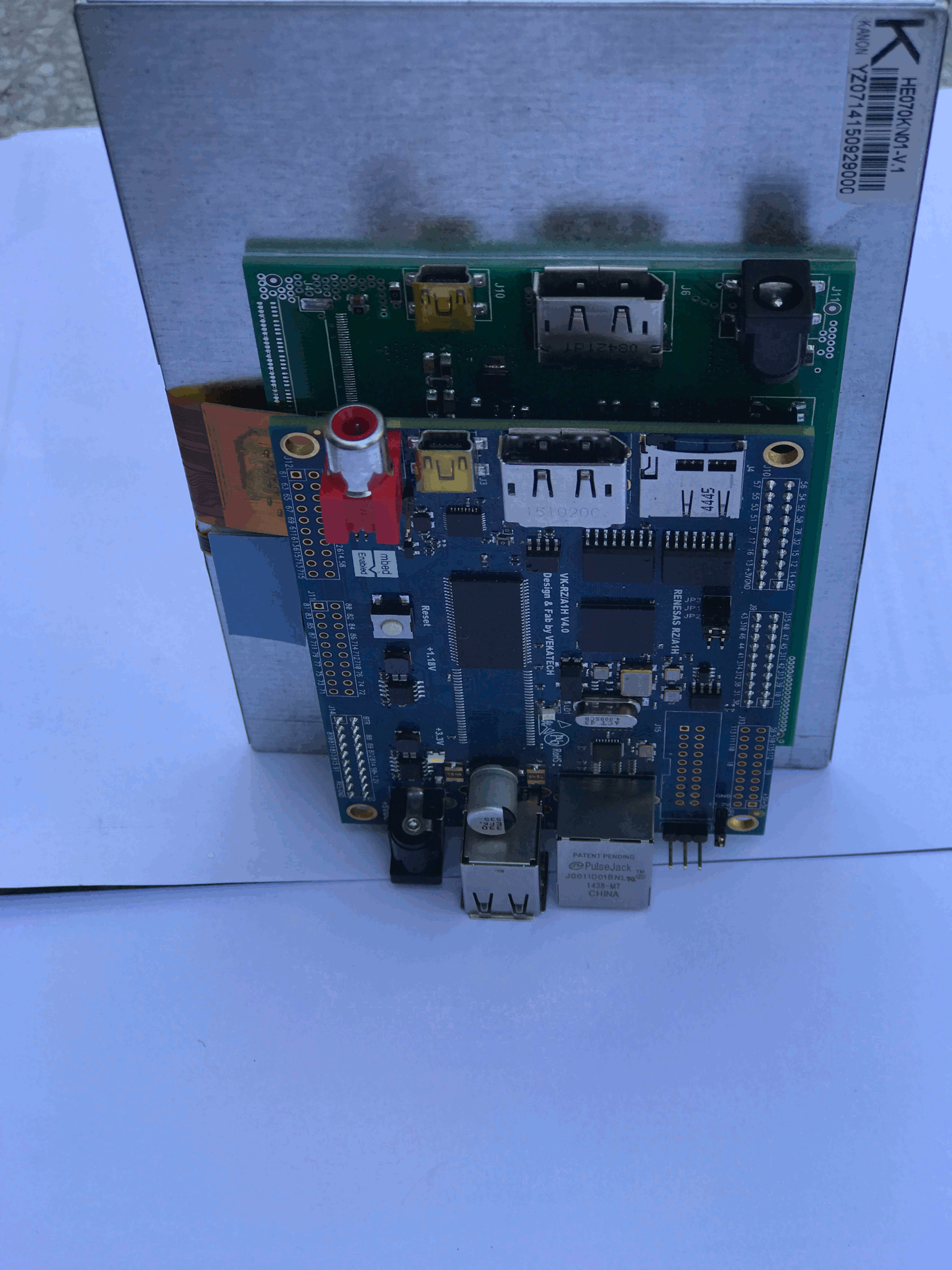
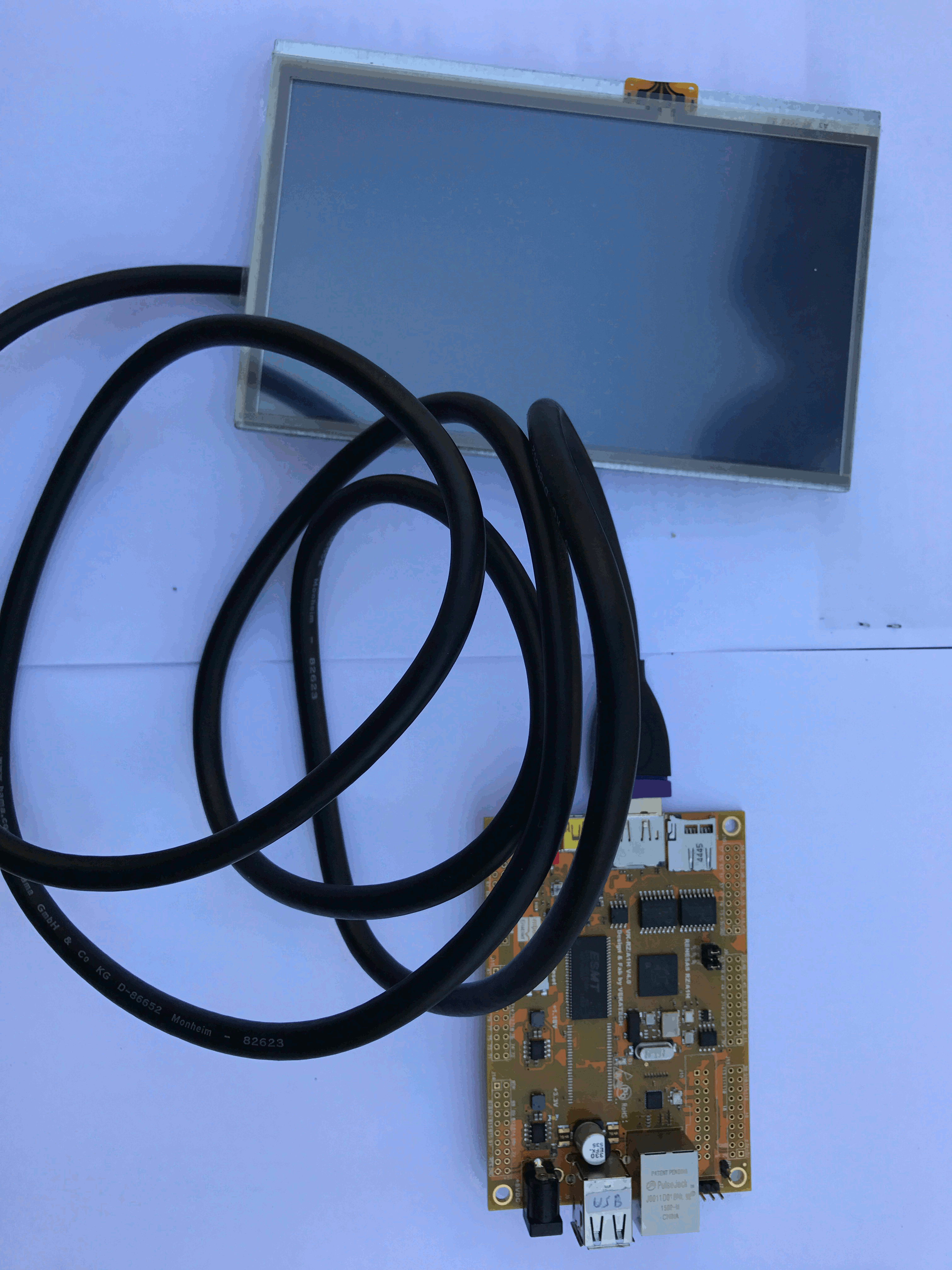
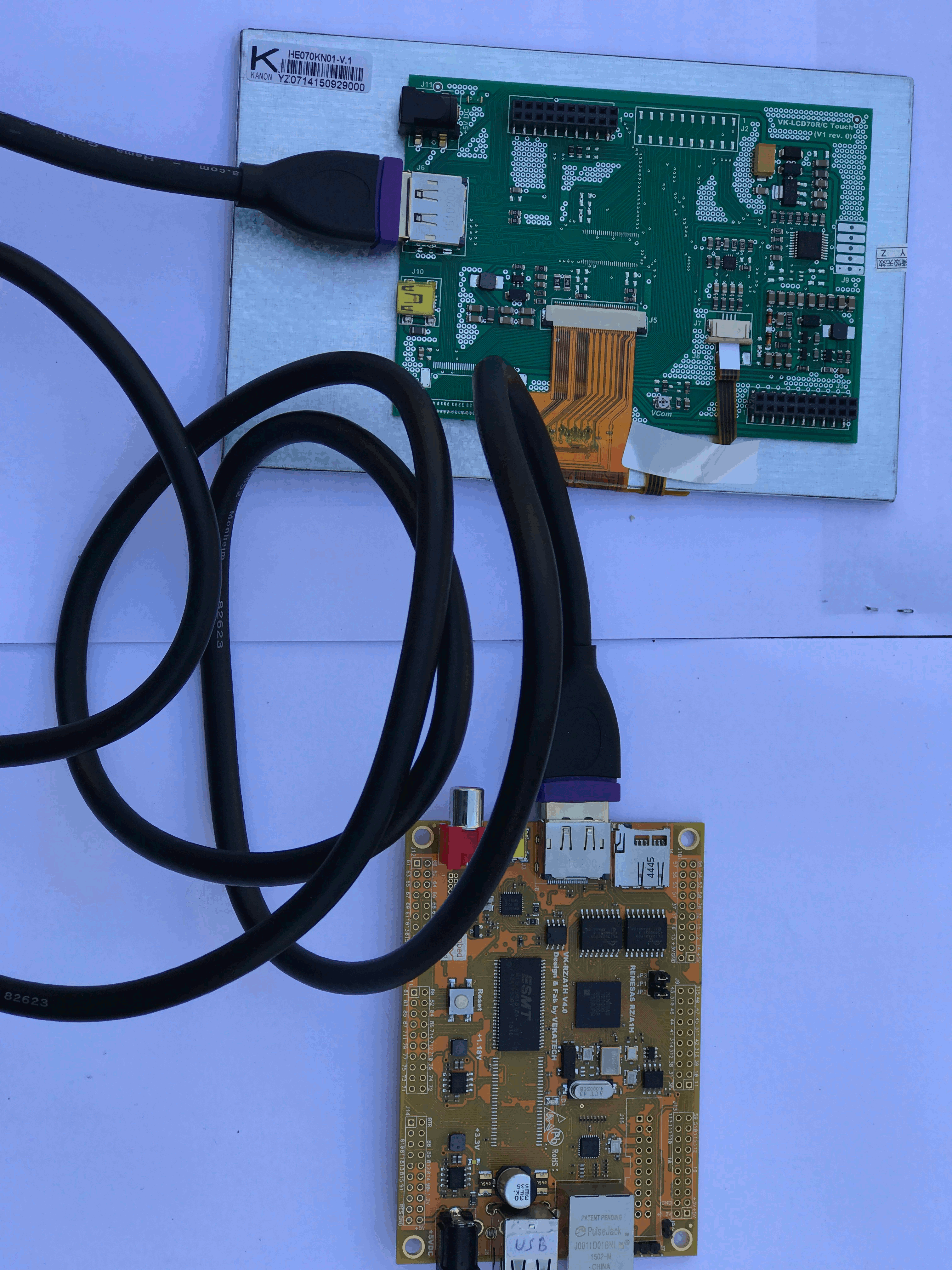
How to Configure ?
You can choose which display is installed by altering the lcd_panel.h file
Leave the active one & comment out the others:
#define LCD_VDC5_CH0_PANEL LCD_CH0_PANEL_VKLCD50RTA //#define LCD_VDC5_CH0_PANEL LCD_CH0_PANEL_VKLCD70RT
You can alter the whole demo with your pictures if you like:
How to compile ?
- The Demo can be compiled in 3 modes:
- I. Execution from the internal 10-MB on-chip SRAM.
- II. Execution from the on-board serial FALSH in dual (32-MB) mode.
- After import in the online compiler just leave only the VKRZA1H_DOUBLE.sct & delete all others linker files in the TOOLCHAIN_ARM_STD folder.
- Drag & drop the result binary in MBED disk, (previously inited in double flash mode)
- III. Execution from the on-board serial FALSH in single (16-MB) mode.
- After import in the online compiler just leave only the VKRZA1H_SINGLE.sct & delete all others linker files in the TOOLCHAIN_ARM_STD folder.
- Drag & drop the result binary in MBED disk, (previously inited in single flash mode )
Quick presentation:
Other demos ?
More demos you can find on our FTP
Diff: USB/USBHost/USBDeviceConnected.cpp
- Revision:
- 0:6435b67ad23c
diff -r 000000000000 -r 6435b67ad23c USB/USBHost/USBDeviceConnected.cpp
--- /dev/null Thu Jan 01 00:00:00 1970 +0000
+++ b/USB/USBHost/USBDeviceConnected.cpp Thu Feb 16 10:23:48 2017 +0000
@@ -0,0 +1,124 @@
+/* mbed USBHost Library
+ * Copyright (c) 2006-2013 ARM Limited
+ *
+ * Licensed under the Apache License, Version 2.0 (the "License");
+ * you may not use this file except in compliance with the License.
+ * You may obtain a copy of the License at
+ *
+ * http://www.apache.org/licenses/LICENSE-2.0
+ *
+ * Unless required by applicable law or agreed to in writing, software
+ * distributed under the License is distributed on an "AS IS" BASIS,
+ * WITHOUT WARRANTIES OR CONDITIONS OF ANY KIND, either express or implied.
+ * See the License for the specific language governing permissions and
+ * limitations under the License.
+ */
+
+#include "USBDeviceConnected.h"
+#include "dbg.h"
+
+USBDeviceConnected::USBDeviceConnected() {
+ init();
+}
+
+void USBDeviceConnected::init() {
+ hub_nb = 0;
+ port = 0;
+ vid = 0;
+ pid = 0;
+ nb_interf = 0;
+ enumerated = false;
+ activeAddr = false;
+ sizeControlEndpoint = 8;
+ device_class = 0;
+ device_subclass = 0;
+ proto = 0;
+ speed = false;
+ for (int i = 0; i < MAX_INTF; i++) {
+ memset((void *)&intf[i], 0, sizeof(INTERFACE));
+ intf[i].in_use = false;
+ for (int j = 0; j < MAX_ENDPOINT_PER_INTERFACE; j++) {
+ intf[i].ep[j] = NULL;
+ strcpy(intf[i].name, "Unknown");
+ }
+ }
+ hub_parent = NULL;
+ hub = NULL;
+ nb_interf = 0;
+}
+
+INTERFACE * USBDeviceConnected::getInterface(uint8_t index) {
+ if (index >= MAX_INTF)
+ return NULL;
+
+ if (intf[index].in_use)
+ return &intf[index];
+
+ return NULL;
+}
+
+bool USBDeviceConnected::addInterface(uint8_t intf_nb, uint8_t intf_class, uint8_t intf_subclass, uint8_t intf_protocol) {
+ if ((intf_nb >= MAX_INTF) || (intf[intf_nb].in_use)) {
+ return false;
+ }
+ intf[intf_nb].in_use = true;
+ intf[intf_nb].intf_class = intf_class;
+ intf[intf_nb].intf_subclass = intf_subclass;
+ intf[intf_nb].intf_protocol = intf_protocol;
+ intf[intf_nb].nb_endpoint = 0;
+ return true;
+}
+
+bool USBDeviceConnected::addEndpoint(uint8_t intf_nb, USBEndpoint * ept) {
+ if ((intf_nb >= MAX_INTF) || (intf[intf_nb].in_use == false) || (intf[intf_nb].nb_endpoint >= MAX_ENDPOINT_PER_INTERFACE)) {
+ return false;
+ }
+ intf[intf_nb].nb_endpoint++;
+
+ for (int i = 0; i < MAX_ENDPOINT_PER_INTERFACE; i++) {
+ if (intf[intf_nb].ep[i] == NULL) {
+ intf[intf_nb].ep[i] = ept;
+ return true;
+ }
+ }
+ return false;
+}
+
+void USBDeviceConnected::init(uint8_t hub_, uint8_t port_, bool lowSpeed_) {
+ USB_DBG("init dev: %p", this);
+ init();
+ hub_nb = hub_;
+ port = port_;
+ speed = lowSpeed_;
+}
+
+void USBDeviceConnected::disconnect() {
+ for(int i = 0; i < MAX_INTF; i++) {
+ intf[i].detach.call();
+ }
+ init();
+}
+
+
+USBEndpoint * USBDeviceConnected::getEndpoint(uint8_t intf_nb, ENDPOINT_TYPE type, ENDPOINT_DIRECTION dir, uint8_t index) {
+ if (intf_nb >= MAX_INTF) {
+ return NULL;
+ }
+ for (int i = 0; i < MAX_ENDPOINT_PER_INTERFACE; i++) {
+ if ((intf[intf_nb].ep[i]->getType() == type) && (intf[intf_nb].ep[i]->getDir() == dir)) {
+ if(index) {
+ index--;
+ } else {
+ return intf[intf_nb].ep[i];
+ }
+ }
+ }
+ return NULL;
+}
+
+USBEndpoint * USBDeviceConnected::getEndpoint(uint8_t intf_nb, uint8_t index) {
+ if ((intf_nb >= MAX_INTF) || (index >= MAX_ENDPOINT_PER_INTERFACE)) {
+ return NULL;
+ }
+ return intf[intf_nb].ep[index];
+}